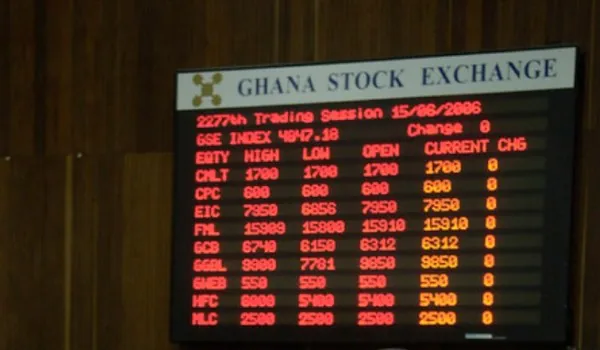The Ghana Stock Exchange (GSE) posted its strongest single-day advance in over a week on Monday as GCB Bank attracted extraordinary buying interest that pushed over 2.4 million shares through the automated trading system.
The GSE Composite Index (GSE-CI) climbed 11.63 points to close at 8,422.19, while the Financial Stocks Index gained 16.82 points to settle at 3,897.28. Both benchmarks extended their year-to-date gains, with the composite index now up 0.72 percent and the financial gauge ahead 0.64 percent since January.
Monday’s session saw 3,162,937 shares change hands valued at GH¢39.19 million, with GCB Bank accounting for more than three-quarters of total turnover. The state-controlled lender traded 2,446,473 shares worth GH¢37.08 million as its stock price advanced GH¢0.15 to close at GH¢15.15.
That price action represents a 1 percent gain for GCB shares, which have become increasingly attractive to investors as Ghana’s banking sector benefits from improved macroeconomic conditions. The stock has surged 135 percent over the past year, transforming a GH¢6.00 share price last October into Monday’s closing level.
MTN Ghana, the telecommunications operator, claimed second position in trading activity with 339,590 shares valued at GH¢1.53 million crossing the market. CAL Bank rounded out the top three most active stocks with 168,705 shares traded worth GH¢121,101.
CAL Bank’s shares gained GH¢0.03 to close at GH¢0.72, while Ecobank Transnational Incorporated (ETI) added GH¢0.01 to reach GH¢0.92. The gains suggest continued investor appetite for banking stocks, which have emerged as the exchange’s strongest performing sector this year.
NewGold Exchange Traded Fund (ETF) recorded the session’s most dramatic price movement, surging GH¢13.09 to close at GH¢489.81. The gold-backed security tracks international gold prices, and Monday’s jump reflects the precious metal’s continued strength amid global economic uncertainty.
TotalEnergies Marketing Ghana provided the session’s only notable decline, slipping GH¢0.04 to end at GH¢36.96. The modest pullback came after recent gains that have pushed the energy marketer’s stock well above its 52-week range.
The market’s advance comes as Ghana’s economy shows signs of stabilization following years of fiscal stress. Lower inflation, a strengthening cedi, and improved investor sentiment have combined to support equity valuations, particularly in the banking sector where profitability has rebounded sharply.
GCB Bank’s dominance of Monday’s trading isn’t unprecedented. The lender, which traces its origins to the 1953 founding of the Bank of the Gold Coast, frequently accounts for significant portions of daily turnover given its size, liquidity, and appeal to both retail and institutional investors.
What makes recent trading patterns noteworthy is the sustained volume. Through early October, GCB has traded an average of 50,317 shares per session over a 63-day period, with total volume exceeding 3.17 million shares valued at GH¢30.2 million. Monday’s single-session volume nearly matched that entire two-month total.
The heavy activity suggests either large institutional repositioning or coordinated buying by multiple investors who view current prices as attractive entry points. With Ghana’s banking sector showing improved asset quality, stronger capital ratios, and growing loan books, equities like GCB have attracted renewed attention from fund managers.
Market capitalization across the exchange now stands at approximately GH¢165 billion, reflecting growing investor confidence despite lingering concerns about Ghana’s broader economic trajectory. The country continues to work through an International Monetary Fund (IMF) program aimed at restoring debt sustainability and macroeconomic stability.
For the GSE, Monday’s performance extends a positive trend that has seen the composite index climb steadily from its January opening level. The 0.72 percent year-to-date gain may appear modest compared to some frontier markets, but it represents a significant improvement over recent years when the exchange struggled with low liquidity and investor outflows.
The Financial Stocks Index’s 0.64 percent advance understates the sector’s performance given the concentration of recent gains in just a handful of banking names. Beyond GCB, CAL Bank, and ETI, several other financial institutions have posted double-digit percentage gains this year as investors price in improved operating environments.
MTN Ghana’s consistent presence among the most traded stocks reflects the telecommunications company’s appeal as a defensive play. With Ghana’s mobile penetration still growing and data usage accelerating, MTN offers investors exposure to structural growth trends less dependent on macroeconomic volatility.
The Ghana Alternative Market (GAX), which lists smaller companies including Samba Foods, MMH, and Hords, recorded no trading activity Monday. The alternative board has struggled to attract sustained investor interest since its establishment, with most trading concentrated on the main exchange.
Looking ahead, market participants will watch whether Monday’s volume surge represents a sustainable shift toward higher trading activity or merely a one-off institutional transaction. The exchange has historically suffered from thin liquidity outside a handful of large-cap stocks, making it difficult for institutional investors to build or exit positions efficiently.
The recent price appreciation in banking stocks also raises questions about valuation. While improved fundamentals justify higher prices, rapid gains can outpace earnings growth, potentially setting up future corrections if investor enthusiasm proves excessive.
For now, though, the combination of positive price action, heavy volume, and sector-wide strength suggests the GSE’s recent momentum may have room to run, particularly if Ghana’s macroeconomic stabilization continues and corporate earnings meet or exceed expectations in upcoming quarterly reports.
Monday’s trading session offered exactly the kind of performance that exchange officials hope will attract broader retail and institutional participation: rising prices, substantial volume, and clear evidence of investor confidence returning to Ghana’s equity market after years of challenges.
Source: newsghana.com.gh











